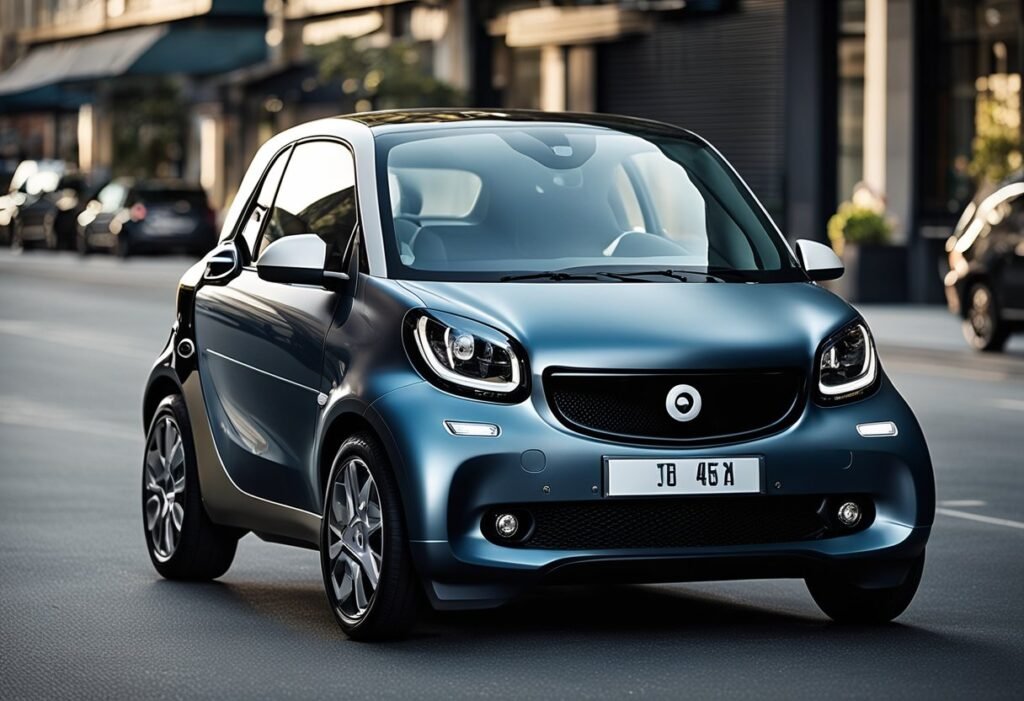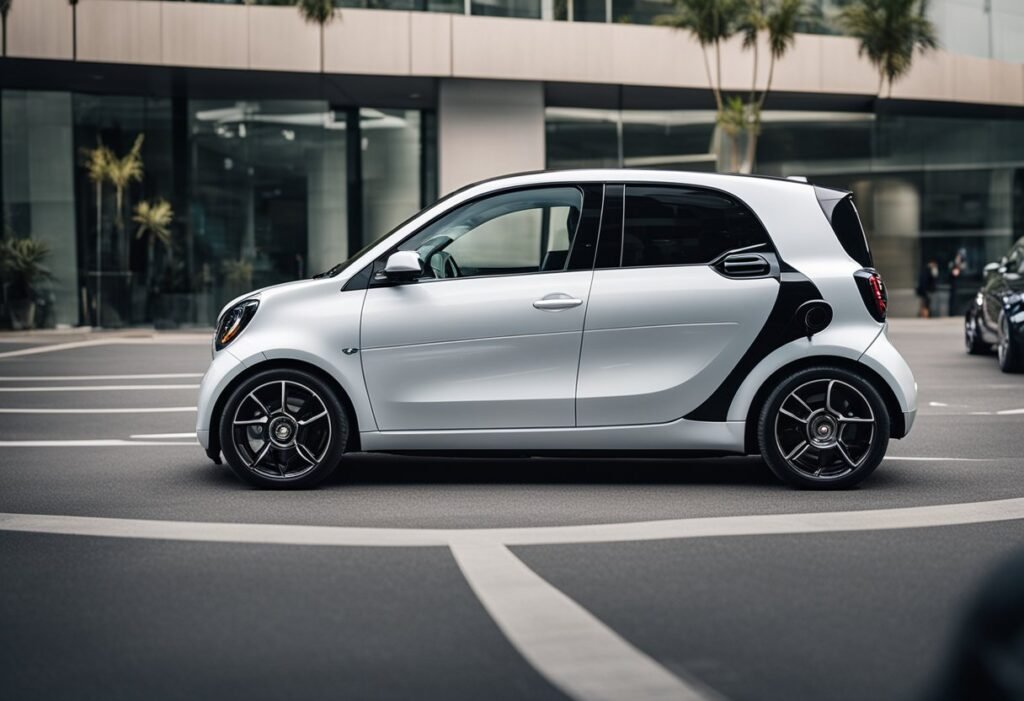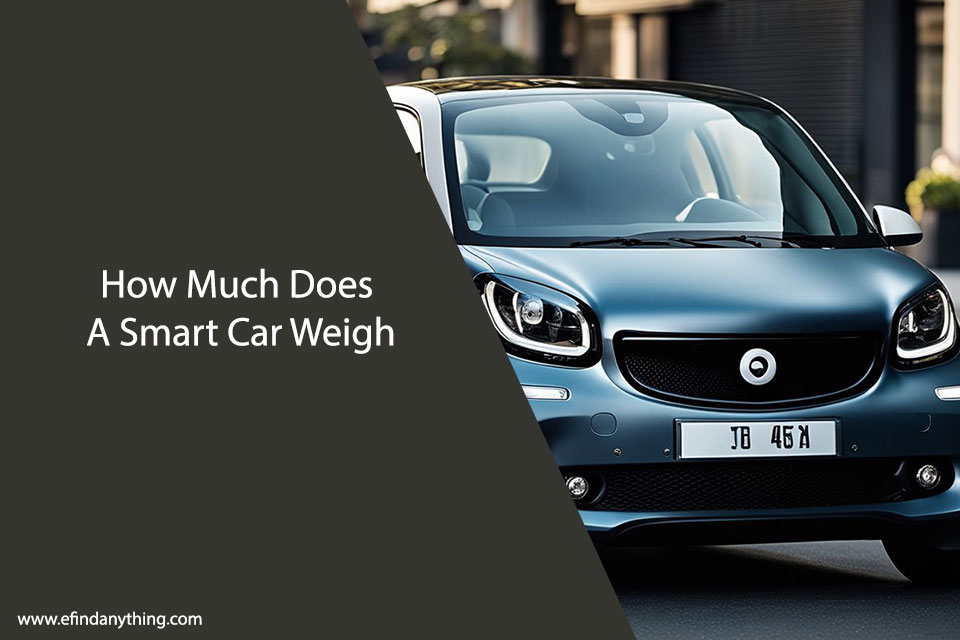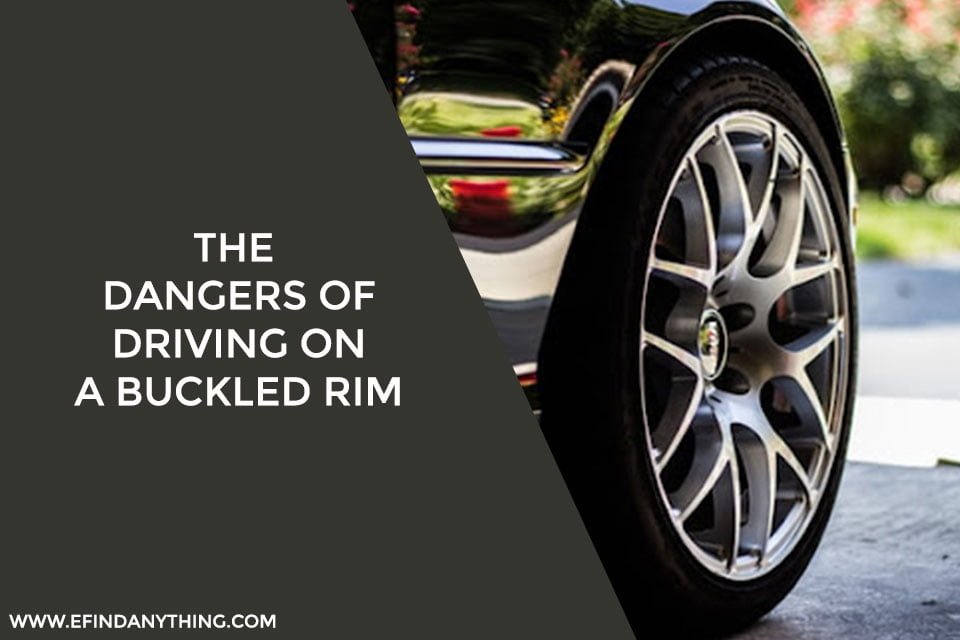Smart cars have become increasingly popular in recent years due to their compact size and fuel efficiency. However, many people wonder how much these tiny vehicles actually weigh. In this article, we will explore the weight of a smart car and provide some context for understanding what that weight means in terms of performance and safety.

To start, it’s important to note that the weight of a smart car can vary depending on the specific model and year. Generally speaking, a smart car weighs around 1,800 pounds. This is significantly lighter than the average weight of a car, which is around 4,000 pounds. Despite its small size, a smart car is designed to be sturdy and safe, with a reinforced steel frame and advanced safety features.
Understanding the weight of a smart car is important for a number of reasons. For example, a lighter car typically uses less fuel, making it more environmentally friendly and cost-effective in the long run. Additionally, a lighter car can be more maneuverable and easier to park in tight spaces. However, it’s also important to consider the potential trade-offs of driving a lighter car, such as reduced stability in high winds or a higher risk of injury in the event of a collision.
Table of Contents
Overview of Smart Cars

Smart cars, also known as micro cars, are a type of compact vehicle that are designed for urban driving. These cars are manufactured by Daimler AG, a German automotive company, and were first introduced to the market in 1998.
One of the most distinctive features of smart cars is their size. They are small and lightweight, making them ideal for navigating through tight city streets and parking in small spaces. In fact, the length of a smart car is only about half the size of a regular sedan.
Despite their compact size, smart cars are equipped with many of the same features as larger vehicles. They have air conditioning, power windows, and even an audio system. Additionally, they are designed with safety in mind and include features such as electronic stability control and multiple airbags.
When it comes to weight, smart cars are some of the lightest vehicles on the market. The weight of a smart car varies depending on the model and year, but generally ranges from 1,500 to 1,800 pounds. This lightweight design allows for better fuel efficiency and easier handling on the road.
Overall, smart cars are a unique and practical option for those who primarily drive in urban areas. Their small size and lightweight design make them easy to maneuver, while still providing many of the features found in larger vehicles.
Average Weight of Smart Cars

When it comes to the weight of Smart Cars, there are a few factors to consider. The weight of a Smart Car can vary depending on the model, the year it was made, and the features it comes with.
On average, a Smart Car weighs around 1,800 pounds (816 kilograms). This weight includes the weight of the car, as well as any passengers and cargo that may be inside.
One of the reasons why Smart Cars are so lightweight is because they are designed to be fuel-efficient. By reducing the weight of the car, it requires less energy to move, which means it can travel further on a single tank of gas or charge.
Another factor that contributes to the weight of a Smart Car is its safety features. Despite its small size, Smart Cars are designed to be safe and sturdy. They are equipped with a reinforced steel frame, as well as advanced safety features such as airbags, traction control, and electronic stability control.
Overall, the average weight of a Smart Car is around 1,800 pounds. While this may seem light compared to other cars on the road, it is important to remember that Smart Cars are designed to be fuel-efficient and safe, without sacrificing performance or comfort.
Factors Influencing Smart Car Weight
When it comes to the weight of a smart car, there are several factors that come into play. In this section, we will discuss some of the most significant factors that influence the weight of a smart car.
Model Variations
One of the most significant factors that affect the weight of a smart car is the model variation. Smart cars come in different models, each with its unique features and specifications. For instance, the Smart Fortwo Coupe weighs around 1,800 pounds, while the Smart Fortwo Cabriolet weighs around 1,874 pounds. The Smart Forfour, on the other hand, weighs around 2,000 pounds. Therefore, the model variation plays a crucial role in determining the weight of a smart car.
Battery Types and Capacities
The battery is another factor that influences the weight of a smart car. Smart cars come with different battery types and capacities, which affect their weight. For instance, the Smart Fortwo Electric Drive comes with a 17.6 kWh battery, which weighs around 440 pounds. On the other hand, the Smart Fortwo ICE comes with a smaller battery, which weighs around 50 pounds. Therefore, the battery type and capacity play a significant role in determining the weight of a smart car.
Materials and Manufacturing
The materials used in the manufacturing of a smart car also play a crucial role in determining its weight. Smart cars are designed to be lightweight, which makes them more fuel-efficient and easier to maneuver. Therefore, the manufacturers use lightweight materials such as aluminum and carbon fiber to reduce the weight of the car. The Smart Fortwo Coupe, for instance, features a Tridion safety cell made of high-strength steel, which weighs around 200 pounds. Additionally, the use of lightweight materials also improves the car’s performance and handling.
In conclusion, the weight of a smart car is influenced by several factors, including the model variation, battery types and capacities, and materials used in manufacturing. Understanding these factors is crucial when choosing a smart car that meets your needs and preferences.
Comparison With Other Vehicles

Smart Cars vs. Compact Cars
Smart cars are often compared to compact cars due to their small size and fuel efficiency. However, when it comes to weight, smart cars are significantly lighter than most compact cars. For example, the 2019 Honda Civic, a popular compact car, weighs around 2,900 pounds, while the 2019 Smart Fortwo, a comparable smart car, weighs only 1,800 pounds. This makes the Smart Fortwo much easier to maneuver and park in tight spaces, but it also means that it may not offer the same level of stability and safety as a heavier car in certain situations.
Smart Cars vs. SUVs
When compared to SUVs, smart cars are significantly lighter and smaller. For instance, the 2019 Jeep Grand Cherokee, a popular SUV, weighs around 4,500 pounds, while the 2019 Smart Fortwo weighs only 1,800 pounds. This means that SUVs are generally more stable and offer better protection in case of an accident. However, smart cars excel in fuel efficiency and maneuverability, making them a great choice for city driving.
Electric vs. Gasoline Smart Car Weights
The weight of a smart car can also vary depending on whether it is electric or gasoline-powered. Generally, electric smart cars are slightly heavier than their gasoline counterparts due to the added weight of the battery. For example, the 2019 Smart Fortwo Electric Drive weighs around 2,400 pounds, while the gasoline-powered version weighs only 1,800 pounds. However, electric smart cars offer the benefit of zero emissions and lower operating costs, making them a popular choice for environmentally-conscious drivers.
Impact of Weight on Performance
When it comes to smart cars, weight plays a crucial role in determining its performance. In this section, we will discuss the impact of weight on fuel efficiency, acceleration and handling, and safety considerations.
Fuel Efficiency
The weight of a smart car affects its fuel efficiency. Generally, the lighter the car, the better the fuel efficiency. This is because the engine doesn’t have to work as hard to move the car, resulting in less fuel consumption. Therefore, a heavier smart car will have lower fuel efficiency compared to a lighter one.
Acceleration and Handling
The weight of a smart car also affects its acceleration and handling. A lighter car will have better acceleration and handling compared to a heavier one. This is because a lighter car requires less power to move, allowing it to accelerate faster and handle better. On the other hand, a heavier car will require more power to move, resulting in slower acceleration and poorer handling.
Safety Considerations
The weight of a smart car also has an impact on its safety. A heavier car will generally be safer in a collision compared to a lighter car. This is because a heavier car has more mass, which means it can absorb more energy during a collision. However, a lighter car can be safer in certain situations, such as when braking or making sudden maneuvers. This is because a lighter car requires less distance to stop or change direction, allowing the driver to avoid collisions more easily.
In conclusion, weight plays a significant role in determining the performance of a smart car. A lighter car will generally have better fuel efficiency, acceleration, and handling, while a heavier car will generally be safer in a collision. Therefore, it’s important to consider the weight of a smart car when making a purchase decision.
Regulations and Standards
Government Vehicle Weight Regulations
When it comes to the weight of smart cars, there are regulations and standards set by the government. In the United States, the National Highway Traffic Safety Administration (NHTSA) sets the standards for vehicle weight and safety. The NHTSA has set specific weight limits for different classes of vehicles, including passenger cars, light-duty trucks, and heavy-duty trucks.
For passenger cars, the weight limit is set at 4,500 pounds. Smart cars fall under the category of passenger cars and are designed to meet this weight limit. Therefore, the weight of a smart car is typically around 1,800 pounds.
Environmental Impact Standards
In addition to government regulations, there are also environmental impact standards that smart cars must meet. These standards are set by the Environmental Protection Agency (EPA) and are designed to reduce the impact of vehicles on the environment.
One of the key environmental impact standards for vehicles is fuel economy. Smart cars are designed to be fuel-efficient and have a high miles-per-gallon (MPG) rating. This means that they use less fuel and produce fewer emissions than other vehicles.
Another environmental impact standard for vehicles is emissions. Smart cars are designed to produce lower emissions than other vehicles, which helps to reduce their impact on the environment. They are equipped with advanced emissions control systems that help to reduce the amount of pollution they produce.
Overall, smart cars are designed to meet government regulations and environmental impact standards. They are lightweight and fuel-efficient, which makes them a great choice for those who are looking for a vehicle that is both eco-friendly and affordable.
Future Trends in Smart Car Design
Lightweight Materials
As smart car manufacturers continue to look for ways to reduce weight and improve fuel efficiency, they are turning to new lightweight materials. One such material is carbon fiber, which is both strong and lightweight. Carbon fiber is currently used in high-end sports cars, but as the cost of production decreases, it is likely to become more common in smart cars.
Another lightweight material that is gaining popularity is aluminum. Aluminum is lighter than steel, which makes it a good choice for reducing the weight of a smart car. In addition, aluminum is corrosion-resistant, which means it will last longer than other materials.
Battery Technology Innovations
One of the biggest challenges facing smart car manufacturers is battery technology. Batteries need to be small, lightweight, and able to hold a charge for a long time. Fortunately, there are several new battery technologies that are being developed that could revolutionize the smart car industry.
One such technology is solid-state batteries. These batteries use a solid electrolyte instead of a liquid one, which makes them safer and more efficient. Solid-state batteries also have a longer lifespan than traditional lithium-ion batteries.
Another battery technology that is being developed is lithium-sulfur batteries. These batteries have a higher energy density than lithium-ion batteries, which means they can hold more energy in a smaller package. In addition, lithium-sulfur batteries are cheaper to produce than lithium-ion batteries.
As smart car manufacturers continue to innovate and improve their designs, we can expect to see more lightweight materials and advanced battery technologies in the future.
Frequently Asked Questions
What is the typical curb weight range for Smart cars?
The typical curb weight range for Smart cars is between 1,550 and 1,800 pounds, depending on the model and year.
How does the weight of a Smart car compare in kilograms and pounds?
The weight of a Smart car ranges from approximately 700 to 820 kilograms, or 1,550 to 1,800 pounds.
What was the curb weight of the Smart Fortwo model from 2016?
The curb weight of the Smart Fortwo model from 2016 was approximately 1,800 pounds.
Can you provide the weights for Smart cars from model years 2008, 2009, 2013, and 2014?
The curb weights for Smart cars from model years 2008, 2009, 2013, and 2014 are as follows:
- 2008 Smart Fortwo: 1,808 pounds
- 2009 Smart Fortwo: 1,808 pounds
- 2013 Smart Fortwo: 1,808 pounds
- 2014 Smart Fortwo: 1,808 pounds
What factors contribute to the weight of an Electric Smart car?
The weight of an Electric Smart car is influenced by several factors, including the weight of the battery, motor, and other electric components.
What are the reasons behind the discontinuation of the Smart car?
The reasons behind the discontinuation of the Smart car include declining sales and the high cost of meeting safety and emissions regulations.





